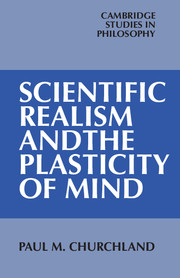Summary
The perspective of scientific realism
The common opinion concerning scientific knowledge and theoretical understanding – of molecules, of stars, of nuclei and electromagnetic waves – is that it is of a kind very different from our knowledge of apples, and tables, and kitchen pots and sand. Whereas theoretical knowledge can be gained only by an act of creative genius, or by diligent study of the genius of another, knowledge of the latter kind can be gained by anyone, by casual observation. Theoretical understanding, it will be said, is artificial where the latter is natural, speculative where the latter is manifest, fluid where the latter is essentially stable, and parasitic where the latter is autonomous.
That these specious contrasts are wholesale nonsense has not prevented them finding expression and approval in the bulk of this century's philosophical literature. Theoretical “knowledge” is there represented as an essentially peripheral superstructure erected on the body of human knowledge proper. This approach did promise some advantages. One could hope to give an account of the semantics of theoretical concepts by explicating the special kinds of relations they must bear to non-theoretical concepts; and one could hope to give an account of the warrant or justification of theoretical beliefs by explicating the relations they must bear to our non-theoretical knowledge. That is, taking the non-theoretical as a temporary given, one could hope to provide a successful account of theoretical understanding short of the larger business of constructing an account of human understanding in general.
- Type
- Chapter
- Information
- Scientific Realism and the Plasticity of Mind , pp. 1 - 6Publisher: Cambridge University PressPrint publication year: 1979

